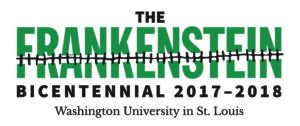On a chilly summer night in 1816, Lord Byron challenged his guests. Who among them could write the best ghost story?
Competition was fierce. Participants included Percy Bysshe Shelley and John William Polidori, author of “The Vampyre,” as well as Byron himself.
But it was young Mary Godwin, soon to be Shelley’s bride, who ultimately prevailed. “Frankenstein” — a tale inspired quite literally by a nightmare — remains a cultural touchstone as well as a powerful metaphor for the dangers of science unchecked by social responsibility.
Over the next three semesters, Washington University in St. Louis will celebrate the 200th anniversary of the 1818 publication of “Frankenstein” with a series of events featuring faculty, students and visiting scholars from across the arts, humanities and life sciences.
In this video, Corinna Treitel, associate professor of history in Arts & Sciences — and lead organizer for the Center for the Humanities’ “Frankenstein at 200” conference — discusses the book’s continued power to challenge and inform.
“Today, ‘Frankenstein’ offers students and scholars a wonderful opportunity to bring two conversations together,” Treitel said. “One has to do with the social consequences of recent exciting discoveries in STEM fields. And the other has to do with a conversation about diversity and inclusion, especially the mechanisms of social othering.”
“The creature is the quintessential outsider,” Treitel said. Which raises a series of interesting questions: “What makes monsters? How does it feel to be a monster? And perhaps most importantly, what do you and I do that helps make monsters?”
 Frankenstein at 200
Frankenstein at 200
Events begin Friday, Aug. 25, with Common Reading Program discussion groups meeting at locations around campus. On Sept. 7, the Washington University Assembly Series will present playwright Nick Dear, who adapted the novel for the Royal National Theatre in London, in conversation with Rebecca Messbarger, professor of Romance literatures and languages in Arts & Sciences, and Henry Schvey, professor of performing arts in Arts & Sciences.
The “Frankenstein at 200” conference, which takes place Oct. 13, will bring together scholars from several universities and disciplines, including history, philosophy, fine arts, literature, Africana studies and performing arts. Other highlights will include a special Frankenstein issue of The Common Reader and “The Curren(t)cy of Frankenstein,” a symposium sponsored by Washington University School of Medicine in St. Louis, as well as films, lectures, performances and exhibits.
For more information, visit the Frankenstein 200 webpage, follow events on Faceook and Twitter, or search #WUFrank200.